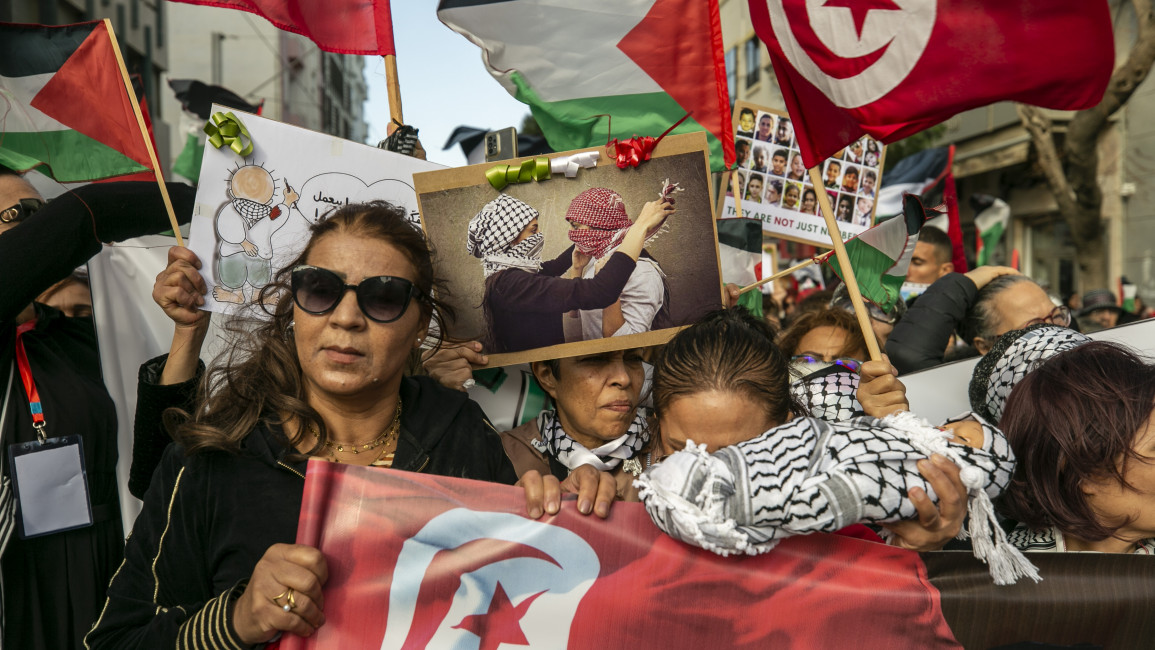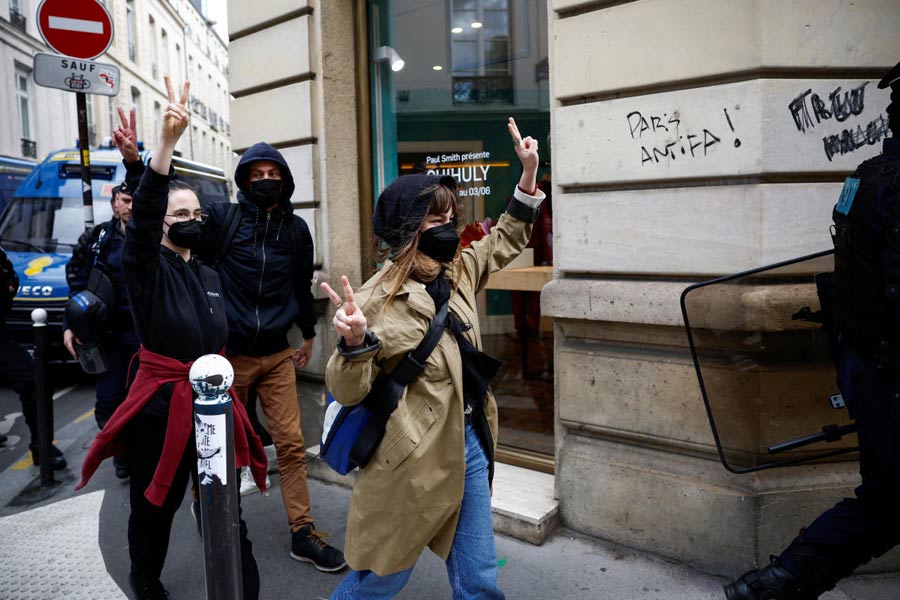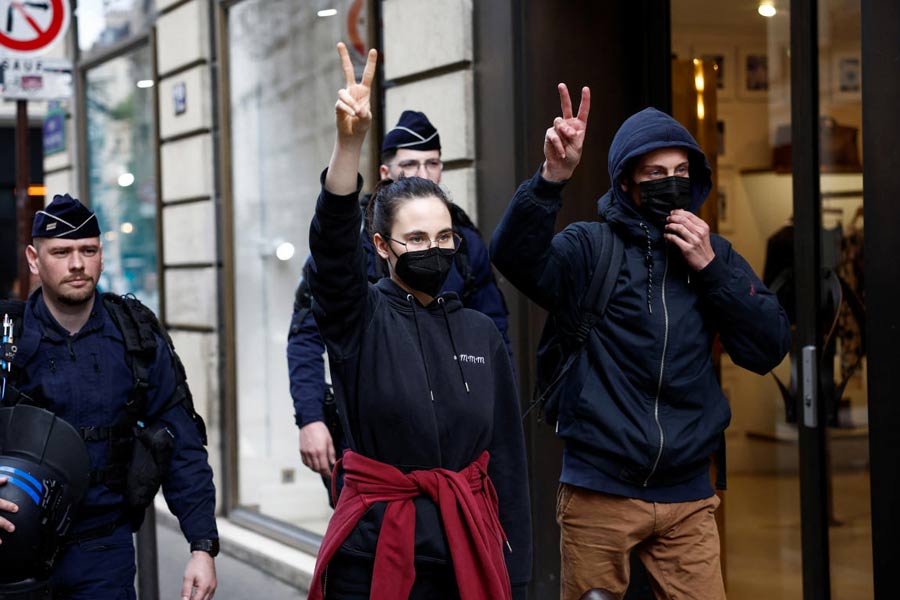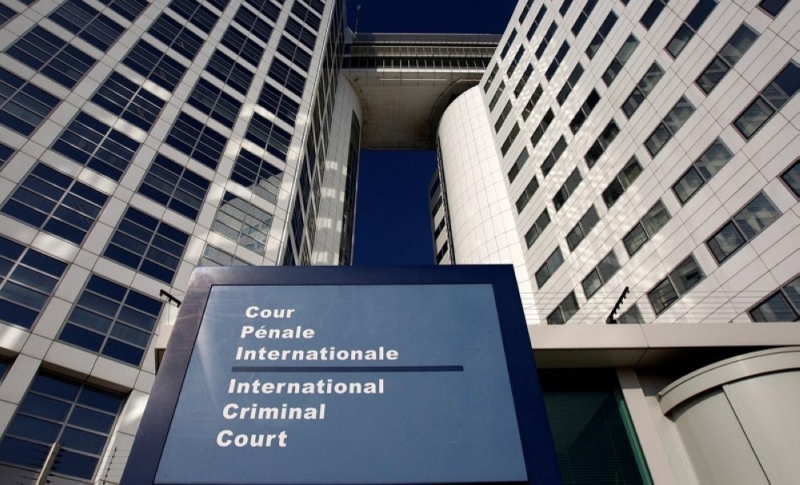Campus protests over the war in Gaza have gone international
MAY 3, 2024

A woman raises her fist while she shouts slogans during a demonstration against Israel's attacks on Gaza, in Mexico City, April 13.Daniel Cardenas/Anadolu via Getty Images
It's an emotional kinship for Ana Jiménez, an 18-year-old UNAM student who grew up in Guerrero, a Mexican region ravaged by drug-related conflict. She says she can relate very powerfully to Palestinian children caught up in the Gaza conflict.
"We need global solidarity, an empathetic world," Jiménez says. "When you're young, there is no other choice but to be a revolutionary."
Eleanor Beardsley contributed reporting from Paris. Eyder Peralta contributed reporting from Mexico City.
MAY 3, 2024
By Willem Marx
NPR

Pro-Palestinian students protest outside the Department for Education on March 22 in London. The students called for an immediate cease-fire in Gaza and for an end to links between U.K. universities and Israel.

Pro-Palestinian students protest outside the Department for Education on March 22 in London. The students called for an immediate cease-fire in Gaza and for an end to links between U.K. universities and Israel.
Mark Kerrison/In Pictures via Getty Images
LONDON — A growing global student movement to occupy university campuses has continued to coalesce and expand in recent days, following dramatic scenes involving pro-Palestinian protesters and police captured on cameras at American colleges.
Student groups in the United Kingdom, France and Mexico — among others — have sought to erect what many of them are terming "solidarity encampments," prompting a variety of responses from university authorities and local law enforcement.
The efforts by students to pressure institutional leaders, and in some cases national policy makers, to change their stances on Israel's military actions reflect a widespread anger among young people in wealthy and developing nations alike.
Sponsor Message

MIDDLE EAST CRISIS — EXPLAINED
Why a majority of Britons want the U.K. to halt arms exports to Israel
These protests are continuing against the backdrop of sustained violence in the Gaza Strip, the continued failure of negotiations led by Qatar, Egypt and the U.S. to bring about a new cease-fire between Israel and Hamas, and renewed threats by Israeli leaders about launching a ground offensive in the southern Gaza city of Rafah.
A common demand among many of the protesters is for their learning institutions to cut ties with companies that conduct business with the Israeli state, or in some cases to end collaboration agreements with universities in Israel.
Student concerns in the U.K. — for instance — seemed to echo the focus of an increasingly high-profile nationwide campaign to end British arms exports to Israel. Earlier this week, hundreds of activists surrounded a government trade office in London and protested at British aerospace manufacturer BAE Systems locations elsewhere in the U.K., leading to arrests.
That came just days after the United Nations' top court in The Hague rejected arguments by Nicaragua that Germany should immediately halt military transfers to Israel.

MIDDLE EAST CRISIS — EXPLAINED
A top U.N. court won't order Germany to halt weapons exports to Israel
The protest against arming Israel is particularly pronounced at Warwick University in central England, where a coalition of students and staff built an encampment on a central campus square late last Thursday evening, April 25, demanding the institution sever relations with companies supplying military materiel to Israel.
"The University of Warwick has some of the most partnerships of any U.K. universities with arms companies," says Fraser Amos, a student member of the group called Warwick Stands For Palestine. "We've been campaigning for the last few months for a university to break these ties — an overwhelming majority of students voted in November for it to do so, and we've seen 27,000 Palestinians die since. And so we've been forced to take this action."

SPECIAL SERIES
Campus protests over the Gaza war
Warwick acknowledges it maintains academic and research partnerships with companies involved in the production of weapons systems or components used in weapons, including Rolls-Royce, BAE Systems and Moog.
In a statement, university spokesperson Bron Mills told NPR, "the University is working to begin discussions with the demonstration's organizers about the demands that have been made."
But so far, few of the student campaigns have seen success.
The elite French university Sciences Po has been rocked by protests over the past week, but administrators on Thursday began what were described by participants as an "emotional" dialogue with students to try and calm the situation.
"It's good to have these debates, because we are in a school that all the time says that we have to debate politics, we have to discuss," said student Ismail El Gataa, soon after participating in those conversations with university authorities.

Students set up camp on the campus of Sorbonne University to stage a protest against the war in Gaza, in Paris on April 29.Ameer Alhalbi/Anadolu via Getty Images
Despite the students' specific demands, Sciences Po's leadership says it would refuse to cut ties or investigate its relationships with four Israeli universities. With the overnight occupation of a school auditorium into Friday morning, the student campaigners responded that their demonstrations would continue — though far more peacefully and less confrontationally than in the United States.
"I feel like the context for U.S. and here are different," El Gataa said. "Unfortunately what I've seen in the U.S. is that there's a lot of extremism in some in some settings."
But by Friday morning, police units began to gather outside Sciences Po's campus — just as they had at another high profile Paris university, the Sorbonne — after authorities requested their help evacuating the students.
Another group, Goldsmiths for Palestine, was created in November last year at Goldsmiths University in London, when students started conducting walkouts, urging university management to make a statement condemning the circumstances facing Palestinians and to divest from a business called Nice Ltd. that sells surveillance equipment to government for use by police units and prison systems.
Graduate student Danna Liu Macrae says their move this week to occupy part of the college's library was quite specific to Goldsmiths, where students had earlier disbanded a previous encampment after university management offered to discuss their concerns, but had then grown disillusioned with those efforts.
"We had sat in multiple meetings with them, and they had made some commitments which they pulled out of — with little explanation," says Liu Macrae, speaking of the latest library occupation. "It made sense for us to put the pressure back on to hold them accountable, make sure they follow through with their commitments."
The pro-Palestinian protests across U.S. campuses have meanwhile prompted largely positive reactions from contemporaries and peers elsewhere — without much sign of the pro-Israel counter-protests seen at several American colleges.
At the National Autonomous University of Mexico, known as UNAM, bullhorns at the country's largest college boomed across campus Thursday as students erected several tents in front of the university's administration buildings to protest Israel's military actions in Gaza.
Mexican geography student Alexa Carranza says she was heartened by the U.S. college protests, particularly since she had long considered U.S. students to be apathetic about global injustice. "To see them wake up inspired me," she says.
Thursday was the first day of the protest, and students were demanding the state of Mexico — not just their own university — should entirely sever its diplomatic relations. "Break ties with Israel," a small crowd chanted, as some students spray-painted signs that read "Long Live Palestine."
At Warwick University, where police and university authorities have largely kept the situation calm, Fraser Amos says the treatment of American student protesters has been "appalling" and his group wants to show "full solidarity" with similar encampments from Columbia University in New York to the University of Texas in Austin.
For Samir Ali, an undergraduate at Goldsmiths in London, students like her are on the front foot right now, at this moment of mutual global support. "We see ourselves as part of that collective struggle and part of that collective student movement," she says.
LONDON — A growing global student movement to occupy university campuses has continued to coalesce and expand in recent days, following dramatic scenes involving pro-Palestinian protesters and police captured on cameras at American colleges.
Student groups in the United Kingdom, France and Mexico — among others — have sought to erect what many of them are terming "solidarity encampments," prompting a variety of responses from university authorities and local law enforcement.
The efforts by students to pressure institutional leaders, and in some cases national policy makers, to change their stances on Israel's military actions reflect a widespread anger among young people in wealthy and developing nations alike.
Sponsor Message

MIDDLE EAST CRISIS — EXPLAINED
Why a majority of Britons want the U.K. to halt arms exports to Israel
These protests are continuing against the backdrop of sustained violence in the Gaza Strip, the continued failure of negotiations led by Qatar, Egypt and the U.S. to bring about a new cease-fire between Israel and Hamas, and renewed threats by Israeli leaders about launching a ground offensive in the southern Gaza city of Rafah.
A common demand among many of the protesters is for their learning institutions to cut ties with companies that conduct business with the Israeli state, or in some cases to end collaboration agreements with universities in Israel.
Student concerns in the U.K. — for instance — seemed to echo the focus of an increasingly high-profile nationwide campaign to end British arms exports to Israel. Earlier this week, hundreds of activists surrounded a government trade office in London and protested at British aerospace manufacturer BAE Systems locations elsewhere in the U.K., leading to arrests.
That came just days after the United Nations' top court in The Hague rejected arguments by Nicaragua that Germany should immediately halt military transfers to Israel.

MIDDLE EAST CRISIS — EXPLAINED
A top U.N. court won't order Germany to halt weapons exports to Israel
The protest against arming Israel is particularly pronounced at Warwick University in central England, where a coalition of students and staff built an encampment on a central campus square late last Thursday evening, April 25, demanding the institution sever relations with companies supplying military materiel to Israel.
"The University of Warwick has some of the most partnerships of any U.K. universities with arms companies," says Fraser Amos, a student member of the group called Warwick Stands For Palestine. "We've been campaigning for the last few months for a university to break these ties — an overwhelming majority of students voted in November for it to do so, and we've seen 27,000 Palestinians die since. And so we've been forced to take this action."

SPECIAL SERIES
Campus protests over the Gaza war
Warwick acknowledges it maintains academic and research partnerships with companies involved in the production of weapons systems or components used in weapons, including Rolls-Royce, BAE Systems and Moog.
In a statement, university spokesperson Bron Mills told NPR, "the University is working to begin discussions with the demonstration's organizers about the demands that have been made."
But so far, few of the student campaigns have seen success.
The elite French university Sciences Po has been rocked by protests over the past week, but administrators on Thursday began what were described by participants as an "emotional" dialogue with students to try and calm the situation.
"It's good to have these debates, because we are in a school that all the time says that we have to debate politics, we have to discuss," said student Ismail El Gataa, soon after participating in those conversations with university authorities.

Students set up camp on the campus of Sorbonne University to stage a protest against the war in Gaza, in Paris on April 29.Ameer Alhalbi/Anadolu via Getty Images
Despite the students' specific demands, Sciences Po's leadership says it would refuse to cut ties or investigate its relationships with four Israeli universities. With the overnight occupation of a school auditorium into Friday morning, the student campaigners responded that their demonstrations would continue — though far more peacefully and less confrontationally than in the United States.
"I feel like the context for U.S. and here are different," El Gataa said. "Unfortunately what I've seen in the U.S. is that there's a lot of extremism in some in some settings."
But by Friday morning, police units began to gather outside Sciences Po's campus — just as they had at another high profile Paris university, the Sorbonne — after authorities requested their help evacuating the students.
Another group, Goldsmiths for Palestine, was created in November last year at Goldsmiths University in London, when students started conducting walkouts, urging university management to make a statement condemning the circumstances facing Palestinians and to divest from a business called Nice Ltd. that sells surveillance equipment to government for use by police units and prison systems.
Graduate student Danna Liu Macrae says their move this week to occupy part of the college's library was quite specific to Goldsmiths, where students had earlier disbanded a previous encampment after university management offered to discuss their concerns, but had then grown disillusioned with those efforts.
"We had sat in multiple meetings with them, and they had made some commitments which they pulled out of — with little explanation," says Liu Macrae, speaking of the latest library occupation. "It made sense for us to put the pressure back on to hold them accountable, make sure they follow through with their commitments."
The pro-Palestinian protests across U.S. campuses have meanwhile prompted largely positive reactions from contemporaries and peers elsewhere — without much sign of the pro-Israel counter-protests seen at several American colleges.
At the National Autonomous University of Mexico, known as UNAM, bullhorns at the country's largest college boomed across campus Thursday as students erected several tents in front of the university's administration buildings to protest Israel's military actions in Gaza.
Mexican geography student Alexa Carranza says she was heartened by the U.S. college protests, particularly since she had long considered U.S. students to be apathetic about global injustice. "To see them wake up inspired me," she says.
Thursday was the first day of the protest, and students were demanding the state of Mexico — not just their own university — should entirely sever its diplomatic relations. "Break ties with Israel," a small crowd chanted, as some students spray-painted signs that read "Long Live Palestine."
At Warwick University, where police and university authorities have largely kept the situation calm, Fraser Amos says the treatment of American student protesters has been "appalling" and his group wants to show "full solidarity" with similar encampments from Columbia University in New York to the University of Texas in Austin.
For Samir Ali, an undergraduate at Goldsmiths in London, students like her are on the front foot right now, at this moment of mutual global support. "We see ourselves as part of that collective struggle and part of that collective student movement," she says.

A woman raises her fist while she shouts slogans during a demonstration against Israel's attacks on Gaza, in Mexico City, April 13.Daniel Cardenas/Anadolu via Getty Images
It's an emotional kinship for Ana Jiménez, an 18-year-old UNAM student who grew up in Guerrero, a Mexican region ravaged by drug-related conflict. She says she can relate very powerfully to Palestinian children caught up in the Gaza conflict.
"We need global solidarity, an empathetic world," Jiménez says. "When you're young, there is no other choice but to be a revolutionary."
Eleanor Beardsley contributed reporting from Paris. Eyder Peralta contributed reporting from Mexico City.
Pro-Palestinian campus protests are going global
Police moved in to clear a sit-in at an elite French university Friday, as encampments were launched at universities around the world, including in Britain, France, Australia and Japan.
May 3, 2024,
By Chantal Da Silva
LONDON — Pro-Palestinian demonstrations that have rocked college campuses in the United States are now gaining traction across the world, from London, Paris and Rome to Sydney, Tokyo, Beirut and beyond.
These protests at schools in major cities around the globe were launched in response to Israel's monthslong military assault on the Gaza Strip, but students told NBC News they were also inspired by the dramatic scenes from colleges in the U.S. in recent weeks.
They have stopped short of the size and intensity of the American encampments, which have stirred fierce debate and clashes with both authorities and pro-Israel counterprotesters. But on Friday, police moved in to clear a sit-in that had closed an elite French university — a sign of the fervent opposition to Israel's actions felt by many young people in countries beyond the U.S., its closest ally.
Video captured by news agencies showed police marching into the Sciences Po university building, with one demonstrator telling NBC News she was among the dozens removed peacefully by authorities.
The office of French Prime Minister Gabriel Attal, who like President Emmanuel Macron is an alum of Sciences Po, said police had been requested to remove students from 23 sites on French campuses Thursday. “All were evacuated within a few hours," his office said.
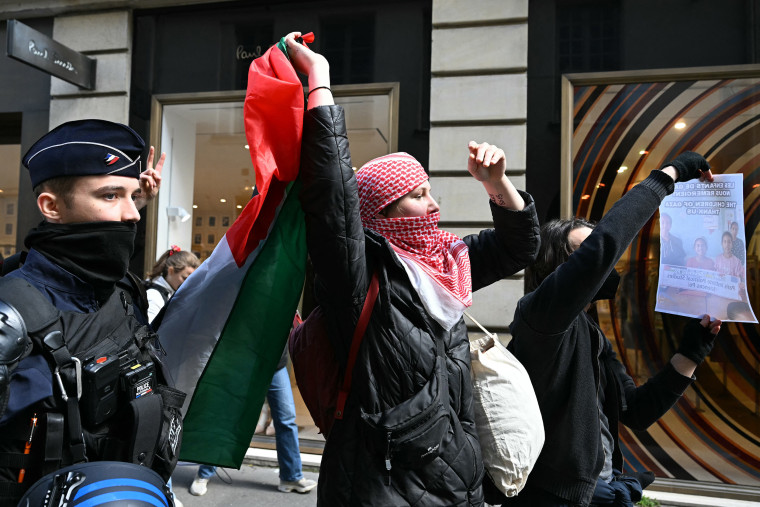
Some students feel silenced
Not all students are supportive of the protest action, with some expressing concerns for their safety and others complaining that the demonstrations have impeded their studies.
"While Jewish students remain resilient, encampments are growing on campus and increasing in hostility," said Edward Isaacs, president of the Union of Jewish Students, which represents Jewish students in the United Kingdom and Ireland.
"Universities must have moral clarity in their leadership to ensure campuses are welcoming and inclusive to Jewish students," he said in a statement on X.
Samuel Lejoyeux, who leads the Union of Jewish Students of France, noted that French student protests appeared more peaceful than those in the U.S.
“With the overwhelming majority of students at French universities, including Sciences Po, it is still possible to have a debate. I even think there is an increased hunger for debate,” he told the broadcaster BFM TV, according to Reuters.
Some protests in the U.S. have drawn accusations of antisemitism, which Jewish groups say has been on the rise in the midst of the Israel-Hamas war. Student protesters, who include Jewish participants, have rejected the accusation, with some saying claims of antisemitism are being weaponized against them in an effort to dismiss criticisms of Israel's actions in Gaza.
Elisa Lin, a 21-year-old master's degree student studying public policy at Sciences Po, said she is one of many students who feel caught in the middle of mounting tensions on campus.
"We feel like a few minorities on both sides of the protest, like pro-Palestinian and pro-Israel, kind of took away the mic and we as a silent majority can't really say what we feel without being immediately bashed or insulted," she said.
Earlier this week, she and other students launched an online petition calling for open dialogue between students and the university's administration — as well as for demonstrators to stop blockading the school and for those who have "illegally" occupied buildings on campus to be reprimanded.
As of Friday, just over 1,170 people had signed the petition, launched Monday on Change.org.
“Of course, I do have my own convictions,” said Lin, who is from Paris. “I personally condemn the terrorist attack by the Hamas organization during the 7th of October. I very clearly condemn these attacks, but at the same time, I’m very strongly against the politics of Netanyahu in Israel,” she added.
Some 1,200 people were killed and 250 taken hostage in the Hamas-led attack, according to Israeli officials. More than 34,000 people have been killed in Gaza since Israel launched its operation in the wake of that attack, according to the Palestinian enclave's Health Ministry.
Lin said that she and other students wanted to be able to continue their studies and speak freely about their beliefs without fearing retribution from their peers.
In Australia, hundreds of people took part in demonstrations at the University of Sydney, with tents set up including one emblazoned with the words: “Free Gaza.”
Tensions appeared to rise as demonstrators were confronted by a rally of pro-Israel supporters, Reuters reported.
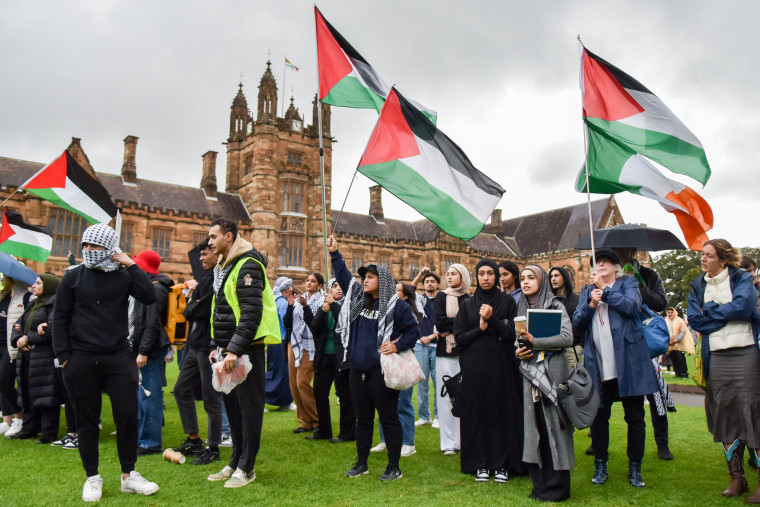
Police moved in to clear a sit-in at an elite French university Friday, as encampments were launched at universities around the world, including in Britain, France, Australia and Japan.
May 3, 2024,
By Chantal Da Silva
LONDON — Pro-Palestinian demonstrations that have rocked college campuses in the United States are now gaining traction across the world, from London, Paris and Rome to Sydney, Tokyo, Beirut and beyond.
These protests at schools in major cities around the globe were launched in response to Israel's monthslong military assault on the Gaza Strip, but students told NBC News they were also inspired by the dramatic scenes from colleges in the U.S. in recent weeks.
They have stopped short of the size and intensity of the American encampments, which have stirred fierce debate and clashes with both authorities and pro-Israel counterprotesters. But on Friday, police moved in to clear a sit-in that had closed an elite French university — a sign of the fervent opposition to Israel's actions felt by many young people in countries beyond the U.S., its closest ally.
Video captured by news agencies showed police marching into the Sciences Po university building, with one demonstrator telling NBC News she was among the dozens removed peacefully by authorities.
The office of French Prime Minister Gabriel Attal, who like President Emmanuel Macron is an alum of Sciences Po, said police had been requested to remove students from 23 sites on French campuses Thursday. “All were evacuated within a few hours," his office said.
VIDEO01:26

A protester is escorted away by police in Paris on Friday. Miguel Medina / AFP - Getty Images
'We really felt inspired'
A growing number of protests have also been launched on campuses in the United Kingdom.
"I think we felt really inspired seeing Columbia and just all the universities cropping up with the encampments," Ella Ward, a 21-year-old environmental science student at the University of Leeds in northern England, said in a phone interview Friday.
Around 50 students at Leeds launched their own encampment Wednesday, according to Ward, a representative of Youth Demand, a student-led group calling for a two-way arms embargo on Israel. She said she did not play an active role in organizing the demonstration, but supported the initiative and hoped to see it grow.
"I think Palestine has woken a lot of us up," she said. And seeing students in the U.S. continue to hold mass demonstrations, despite thousands of people facing arrest and suspension from their schools, "it's so important," she said.
Ward said that as of Friday, university administrators at Leeds had not "condemned or condoned" the students' encampment.
The University of Leeds did not respond to a request for comment from NBC News.
Several other universities in the U.K. have seen pro-Palestinian demonstrations crop up on campuses in recent days, according to photos and videos posted to social media, including University College London, the University of Warwick and Newcastle University.
A spokesperson for the University of Warwick said the protests were being "managed in line with our legal duty and commitment to allow freedom of speech on campus."
University College London and Newcastle University did not respond to requests for comment from NBC News
'We really felt inspired'
A growing number of protests have also been launched on campuses in the United Kingdom.
"I think we felt really inspired seeing Columbia and just all the universities cropping up with the encampments," Ella Ward, a 21-year-old environmental science student at the University of Leeds in northern England, said in a phone interview Friday.
Around 50 students at Leeds launched their own encampment Wednesday, according to Ward, a representative of Youth Demand, a student-led group calling for a two-way arms embargo on Israel. She said she did not play an active role in organizing the demonstration, but supported the initiative and hoped to see it grow.
"I think Palestine has woken a lot of us up," she said. And seeing students in the U.S. continue to hold mass demonstrations, despite thousands of people facing arrest and suspension from their schools, "it's so important," she said.
Ward said that as of Friday, university administrators at Leeds had not "condemned or condoned" the students' encampment.
The University of Leeds did not respond to a request for comment from NBC News.
Several other universities in the U.K. have seen pro-Palestinian demonstrations crop up on campuses in recent days, according to photos and videos posted to social media, including University College London, the University of Warwick and Newcastle University.
A spokesperson for the University of Warwick said the protests were being "managed in line with our legal duty and commitment to allow freedom of speech on campus."
University College London and Newcastle University did not respond to requests for comment from NBC News
.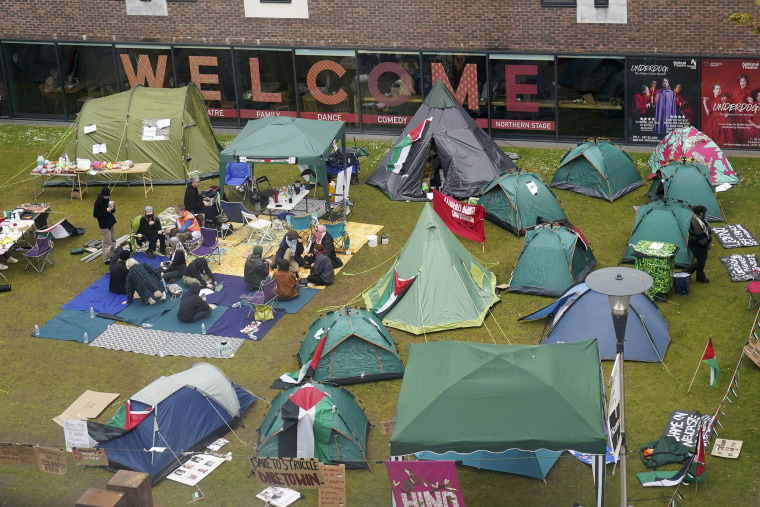

An encampment on the grounds of Newcastle University in northeast England, one of many that have popped up in Britain.Owen Humphreys / AP
Some students feel silenced
Not all students are supportive of the protest action, with some expressing concerns for their safety and others complaining that the demonstrations have impeded their studies.
"While Jewish students remain resilient, encampments are growing on campus and increasing in hostility," said Edward Isaacs, president of the Union of Jewish Students, which represents Jewish students in the United Kingdom and Ireland.
"Universities must have moral clarity in their leadership to ensure campuses are welcoming and inclusive to Jewish students," he said in a statement on X.
Samuel Lejoyeux, who leads the Union of Jewish Students of France, noted that French student protests appeared more peaceful than those in the U.S.
“With the overwhelming majority of students at French universities, including Sciences Po, it is still possible to have a debate. I even think there is an increased hunger for debate,” he told the broadcaster BFM TV, according to Reuters.
Some protests in the U.S. have drawn accusations of antisemitism, which Jewish groups say has been on the rise in the midst of the Israel-Hamas war. Student protesters, who include Jewish participants, have rejected the accusation, with some saying claims of antisemitism are being weaponized against them in an effort to dismiss criticisms of Israel's actions in Gaza.
Elisa Lin, a 21-year-old master's degree student studying public policy at Sciences Po, said she is one of many students who feel caught in the middle of mounting tensions on campus.
"We feel like a few minorities on both sides of the protest, like pro-Palestinian and pro-Israel, kind of took away the mic and we as a silent majority can't really say what we feel without being immediately bashed or insulted," she said.
Earlier this week, she and other students launched an online petition calling for open dialogue between students and the university's administration — as well as for demonstrators to stop blockading the school and for those who have "illegally" occupied buildings on campus to be reprimanded.
As of Friday, just over 1,170 people had signed the petition, launched Monday on Change.org.
“Of course, I do have my own convictions,” said Lin, who is from Paris. “I personally condemn the terrorist attack by the Hamas organization during the 7th of October. I very clearly condemn these attacks, but at the same time, I’m very strongly against the politics of Netanyahu in Israel,” she added.
Some 1,200 people were killed and 250 taken hostage in the Hamas-led attack, according to Israeli officials. More than 34,000 people have been killed in Gaza since Israel launched its operation in the wake of that attack, according to the Palestinian enclave's Health Ministry.
Lin said that she and other students wanted to be able to continue their studies and speak freely about their beliefs without fearing retribution from their peers.
In Australia, hundreds of people took part in demonstrations at the University of Sydney, with tents set up including one emblazoned with the words: “Free Gaza.”
Tensions appeared to rise as demonstrators were confronted by a rally of pro-Israel supporters, Reuters reported.

A pro-Palestinian protest at the University of Sydney on Friday.
Ayush Kumar / AFP - Getty Images
A university spokesperson told NBC News in a statement Wednesday that school administrators wanted to honor its "long tradition of understanding that peaceful protests can be important demonstrations of free speech." But the spokesperson also said that "exercising such freedom of expression must not inhibit the freedom of other members of our community."
On Thursday, the spokesperson said the school had begun investigating "some alleged behavior on our campus that is completely unacceptable." The spokesperson did not expand on what behavior was alleged to have taken place, but said anyone found to have violated the university's code of conduct could face disciplinary action.
“We’re also cooperating with police investigations where alleged conduct might have broken the law,” the spokesperson said.
Demonstrations have also been reported at schools in other major cities, including Sapienza University of Rome in Italy, the University of Toronto in Canada, the University of Tokyo in Japan, the American University of Beirut and the Lebanese American University in Lebanon, and the National Autonomous University of Mexico.
Ward, in the U.K., noted that demonstrations at many universities around the world appeared to lack the level of intensity and friction as those seen in the U.S.
She said she believed there were multiple reasons for that, including the level of outrage in the U.S. over Washington’s active role in funding and arming Israel’s military. But she also said the U.S. had gained a reputation on the international stage for cracking down on such protests.
“I’d be very very surprised if the one in Leeds ended with, you know, riot police,” she said. “That’s quite a U.S.-specific thing.”
A university spokesperson told NBC News in a statement Wednesday that school administrators wanted to honor its "long tradition of understanding that peaceful protests can be important demonstrations of free speech." But the spokesperson also said that "exercising such freedom of expression must not inhibit the freedom of other members of our community."
On Thursday, the spokesperson said the school had begun investigating "some alleged behavior on our campus that is completely unacceptable." The spokesperson did not expand on what behavior was alleged to have taken place, but said anyone found to have violated the university's code of conduct could face disciplinary action.
“We’re also cooperating with police investigations where alleged conduct might have broken the law,” the spokesperson said.
Demonstrations have also been reported at schools in other major cities, including Sapienza University of Rome in Italy, the University of Toronto in Canada, the University of Tokyo in Japan, the American University of Beirut and the Lebanese American University in Lebanon, and the National Autonomous University of Mexico.
Ward, in the U.K., noted that demonstrations at many universities around the world appeared to lack the level of intensity and friction as those seen in the U.S.
She said she believed there were multiple reasons for that, including the level of outrage in the U.S. over Washington’s active role in funding and arming Israel’s military. But she also said the U.S. had gained a reputation on the international stage for cracking down on such protests.
“I’d be very very surprised if the one in Leeds ended with, you know, riot police,” she said. “That’s quite a U.S.-specific thing.”
The "Student Spring" protests on US campuses, the biggest since the Vietnam demonstrations in the 1960s and 1970s, have inspired universities from Australia to Mexico to the United Kingdom to protest in solidarity with Palestine.

AFP
Members of the Australian Palestinian community shout slogans at the Palestinian Protest Campsite at University of Sydney in Sydney on May 3, 2024. / Photo: AFP
Thousands of students protesting Israel's war in Gaza rallied at some of the top universities worldwide demanding divest from companies with ties to Israel, in a movement inspired by the student protests in several US campuses.
Hundreds of people protesting Israel's war on Gaza set up an encampment last week outside the sandstone main hall at University of Sydney, one of Australia's largest tertiary institutions.
Similar camps have sprung up at universities in Melbourne, Canberra and other Australian cities.
Unlike in the US, where police have forcibly removed scores of defiant antiwar protesters at several colleges, demonstration sites in Australia have been peaceful with scant police presence.

AFP
Members of the Australian Palestinian community gather at the Palestinian Protest Campsite at University of Sydney in Sydney on May 3, 2024.
In Canada, students erected antiwar camps across some of the largest universities, including the University of Toronto, the University of British Columbia and the University of Ottawa, demanding they divest from groups with ties to Israel.

AFP
Pro-Palestinian demonstrators wave flags and hold up smartphones outside the fenced in area of an encampment on the University of Toronto campus on May 2, 2024, in Toronto, Canada.
In Mexico, dozens of pro-Palestinian students from the country's largest university camped out in solidarity as well.

AFP
Pro-Palestinian students and activists face police officers after protesters were evicted from the library on campus earlier in the day at Portland State University in Portland, Oregon on May 2, 2024.
Mounting flags and chanting "Long live free Palestine," the protesters set up tents in front of the National Autonomous University of Mexico's (UNAM) head office in Mexico City.
The students called on the Mexican government to break diplomatic and commercial ties with Israel.

AFP
Activists from the Interuniversity and Popular Assembly in Solidarity with the People of Palestine erect tents in front of the rectory building of the Autonomous University of Mexico (UNAM)
In Türkiye, a group at Bogazici University's South Square held a rally in support of Palestine, carrying balloons and signs in Turkish, English, and Arabic.
Students condemned Israel's attacks in Palestine despite international outcry, pledging solidarity with Palestinian people and denouncing the atrocities in Gaza with US support.
Students also called for an end to the humanitarian crisis and justice for the victims, urging intervention to stop the crimes against humanity committed by the Zionist regime.

AA
Students from Bogazici University Islamic Studies Club (BISAK) gather to organise a solidarity demonstration for Pro-Palestinian encampment in the US universities such as Columbia University, in Istanbul.
Students from the universities Warwick, York, Leeds, Newcastle, Bristol and Sheffield in the United Kingdom are set to hold action at the campuses against administration of universities and British government in solidarity with the Palestinians.
Students will finalise demands and publish them at the Bristol University while they hold protest/rally outside the senate of the University.

REUTERS
People gather during a protest in support of Palestinians, during the ongoing conflict between Israel and the Palestinian Islamist group Hamas, at Newcastle University, in Newcastle, Britain.
Earlier this week, hundreds of students gathered outside the University of Tehran to express support for students in the US protesting against the Israeli war on Gaza.
Shouting slogans against Israel and the US, protesters condemned police action against students at various US universities in recent days, including Columbia University.

OTHERS
Students at Amirkabir University of Technology in the Iranian capital of Tehran are seen in a pro-Palestine rally on April 28, 2024.
In France, protesters supporting Palestine gathered at Paris' Sorbonne University, chanting "Free Palestine" and setting up tents.

AFP
Students display a giant Palestinian flag as they take part in a rally in support of Palestinians at the Sorbonne University in Paris on April 29, 2024.
The Sorbonne protest was peaceful, with students calling for the university to condemn Israel.
Police secured the area, and several French politicians, including Mathilde Panot, encouraged support for the protest.
Paris' Sciences Po university was closed for the day on Friday after a debate between the institute's leadership and students on the war in Gaza failed to ease tensions, prompting protesters to occupy it overnight.
SOURCE: TRTWORLD AND AGENCIES




